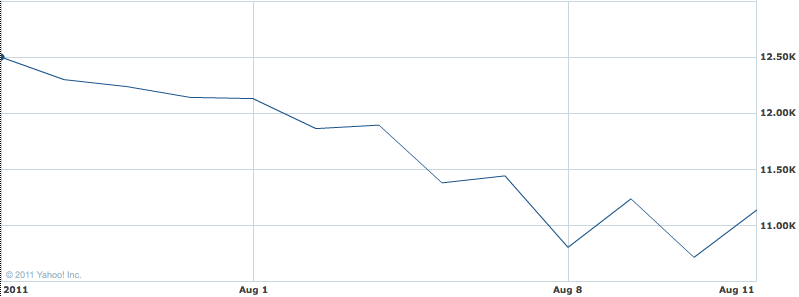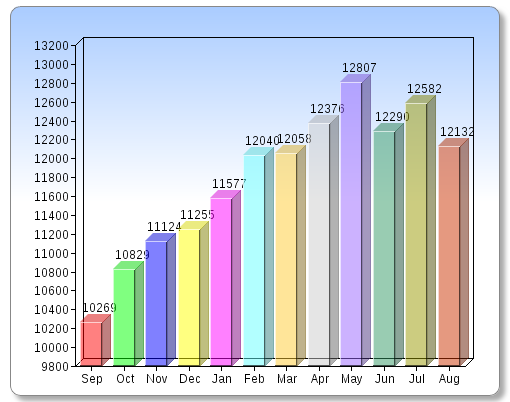That there’s too much information is obvious. So don’t perpetuate the problem.
If you’re reading this, then presumably you’re financially curious if not financially savvy. As the old saying was supposed to go, curiosity killed the overzealous investor. Here, just this once, resist the temptation to check the market daily. It does you no good to let your moods move in sync with what other people are willing to pay for stocks. If the public is an ass, what does that make the person who lets them dictate his behavior? Instead of exposing yourself to numbers that you’re powerless to do anything about anyway, live your life. Walk your dog. Learn HTML. Take shooting lessons. Floss your teeth, which you probably don’t do enough anyway.
The Wall Street Journal, Yahoo! Finance and every general news outlet’s business section each devote a prominent place to the same particular piece of information, listing the index values and changes from yesterday (or from the previous hour, or sometimes the previous minute.) Every change, no matter how minor, becomes newsworthy by definition: otherwise, CNBC and Fox Business would be reporting on something else.
Even no news is news: “Stocks remained largely unchanged today.”
If you’ve ever obsessed about your weight, and most people have, you’ve stepped on the scale daily. (We’re talking to the normal-sized people in the audience, not the fat ones.) It’s not uncommon to weigh yourself twice or even more times a day; say, immediately before and after a workout. (Note to the fat people who are still reading after specifically being told not to a couple of lines ago: a “workout” is this procedure by which you combine aerobic and anaerobic exercise in order to build muscle and burn lipids. “Exercise” is this…oh, never mind.)
Ever been in a relationship where either you or the other person constantly looked for reinforcement? If it happens often enough, suffocation sets in and the relationship crumbles. If he loved you 6 hours ago, and last week, and last month, and a year ago, chances are pretty good he still loves you now.
The week of August 8-12 was an anomaly among weeks on the New York Stock Exchange, with 400-point swings every day. Given the level of the Dow, that means changes of less than 4% every day. Each of which might be meaningful if every jump hadn’t been followed by a fall of similar magnitude, and vice versa.
400-point swings on an index that sits around 11,000 aren’t as important as you think, especially given how fleeting they are. For a comparison, thank God the ordinary digital bathroom scale only gives readouts to the nearest half-pound. There are people reading this right now who would freak out and discover a new thing to obsess over if there existed a commercial scale that could weigh you at 150.3489 pounds first thing in the morning, 151.9849 after breakfast, 150.6227 before lunch and 150.1452 when you went to bed.
Here’s 12 days’ worth of recent market movement:
And 12 months’ worth, each plot point representing the Dow on the 1st day of the given month (or the 31st day of the previous month if the 1st was a Saturday, etc.)
Note the difference in the heights, but also note the difference in the scale.
Most importantly, note the difference in the progression. The same investors and railbirds who were alternately cheering and cursing the market throughout the time span of the first chart could probably look at the second chart with sober happiness, if they a) wanted prices to rise and b) had the capacity to process information at this more deliberate speed.
Seriously, look at the pretty multihued second chart again. Tell the typical investor in September of 2010 that the market is going to do that over the next year, and she’d have been overjoyed. Unless, of course, she was selling everything short. Granted she’d have preferred to have gotten out of the market back in May, but we humans haven’t been equipped with functional hindsight. All in all, the market has shown a consistent path toward growth over the past year. No, it might not in the future. As usual, that’s not the point.
When you check the market as often as it swings, that makes as much sense as a climatologist duly noting that her geographic region of interest warms up every morning yet gets colder every evening. It’s not that the data means nothing, it’s that it means nothing unless placed in the appropriate context. If you’re a mayfly, or Zsa Zsa Gabor, then go ahead and check stock prices as often as you can. In fact, even that doesn’t make sense because if you’ve only got a short time ahead of you you should be enjoying life, not looking at columns of data.
Most of you are going to check the market tomorrow regardless of what we suggest. If you’re really hungry for information, browse our archives. Or better yet, buy our book and learn what else you should be doing.
**This article is featured in the Yakezie Carnival, The Hurricane Season Edition**




